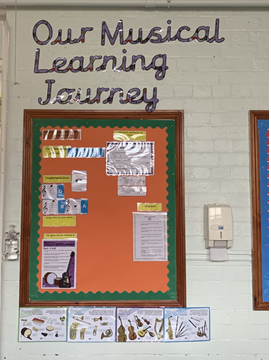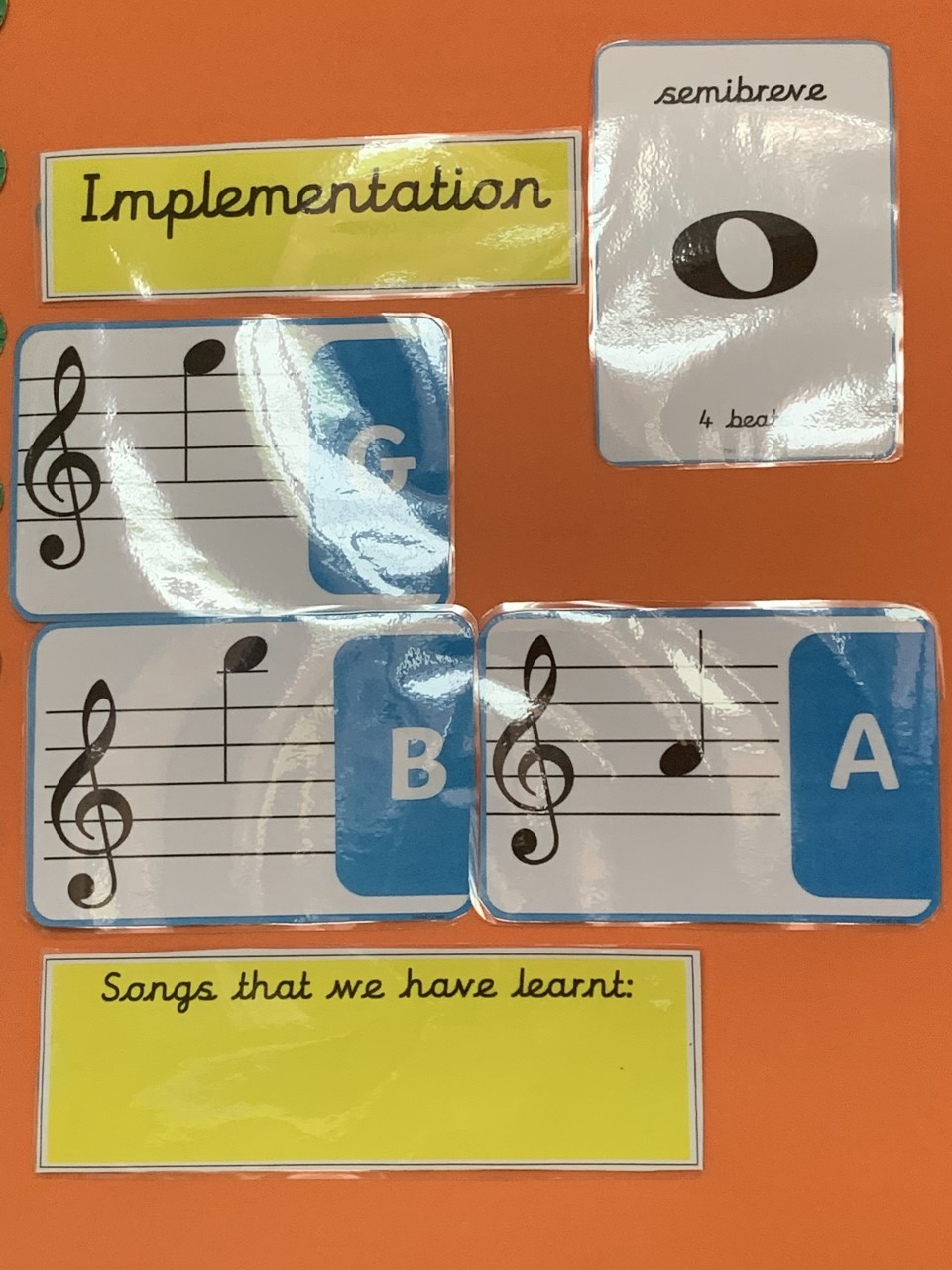Music
Vision and intent for Music
At Temple Meadow, we encourage children to participate in a variety of musical experiences through which we aim to build the confidence of all children. We aim for Music lessons to be fun and inspiring, engaging children with songs, lyrics and movement. We want children to be able to be reflective and expressive; developing their own appreciation of music with the opportunities we provide as a school. All children are actively encouraged and given the opportunity to learn to play a musical instrument, from standard classroom instruments to individual instrumental lessons with the visiting peripatetic staff in year four. – make this clearer please KIrsty
Our main priority at Temple Meadow Primary School is to teach and perfect the skills implemented by the National Curriculum for Music. It is intended to provide greater clarity and flexibility, allowing for the development and progression in learning. Our music scheme of work is Charanga and it complements the curriculum and scaffolds the learning opportunities through the Key Stages. Charanga also provides many examples of music styles and genres from different times and places. These are explored through the language of music via, active listening and performing and composing activities which enable understanding of the context and genre.
Through our music lessons children are actively involved in a wide range of musical opportunities. Children develop their singing voices, using body percussion and whole body actions, and learning to handle and play classroom instruments effectively to create and express their own and others’ music. Through a range of whole class, group and individual activities, children have opportunities to explore sounds, listen actively, compose and perform.
Cultural capital considerations for Music
Given our context linked to high levels of deprivation, we are aware of the high need to support development of Temple Meadow pupils’ cultural capital. This is key to their future success in their next stage of eduction and in future life. We plan to ensure that the experiences we provide through our Music curriculum and by connecting learning across subjects, gives them confidence and the capacity to succeed in the future and to support a long term aspiration of all pupils achieving in society.
National Curriculum coverage
We implement all NC expectations for Music. Children are taught a range of knowledge and skills in both Key Stage One and Key Stage Two. By the end of each key stage, pupils are expected to know, apply and understand the matters, skills and processes specified in the relevant programme of study.
Early Years Foundation Stage
The music curriculum is known as; Expressive Arts and Design and is organised on a topic basis. Expressive arts and design is one of the four specific areas within the Early Years Foundation Stage (EYFS). Each specific area is divided into early learning goals, for expressive arts and design these are:
- Exploring and using media and materials- children sing songs, make music and dance, and experiment with ways of changing them. They safely use and explore a variety of materials, tools and techniques, experimenting with colour, design, texture, form and function.
- Being imaginative- Children use what they have learnt about media and materials in original ways, thinking about uses and purposes. They represent their own ideas, thoughts and feelings through design and technology, art, music, dance, role play and stories.
Nursery and Reception access the Charanga Scheme of work which supports teachers in engaging all young children with music. It includes a variety of adult-led and child-inititated activities delivered through planning and play, all the musical learning is focused around nursery rjhymes and action songs. Music in Early Years is also part of continuous provision where children create their own music using instruments they have made or from our music area. Music is also taught through our time for rhyme sessions and through singing in other subject areas.
Key Stage One:
Pupils should be taught to:

Key Stage Two:

Charanga
To enable our children to meet the intentions of the Music Curriculum, it is delievered through the Charanga Musical School Scheme. Charanga is a scheme of work which offers a topic-based approach to support children’s learning in music. A steady progression plan has been built into Charanga, both within each year and from one year to the next, ensuring consistent musical development. By using Charanga as the basis of a scheme of work, we can ensure that they are fulfilling the aims for musical learning stated in the National Curriculum:
Charanga includes many examples of music styles and genres from different times and places. These are explored through the language of music via active listening, performing and composing activities, which enable understanding of the context and genre. Charanga provides a classroom-based, participatory and inclusive approach to music learning. Throughout the scheme, children are actively involved in using and developing their singing voices, using body percussion and whole body actions, and learning to handle and play classroom instruments effectively to create and express their own and others’ music. Through a range of whole class, group and individual activities, children have opportunities to explore sounds, listen actively, compose and perform.
Charanga Musical School Units of Work enable children to understand musical concepts through a repetition-based approach to learning. Learning about the same musical concept through different musical activities enables a more secure, deeper learning and mastery of musical skills. Musical teaching and learning is not neat or linear. The strands of musical learning, presented within the lesson plans and the on-screen resources, are part of the learning spiral. Over time, children can both develop new musical skills and concepts, and re-visit established musical skills and concepts. Repeating a musical skill doesn’t necessarily mean their progress is slowing down or their development is moving backwards! It's just shifting within the spiral. Mastery means both a deeper understanding of musical skills and concepts and learning something new. All musical learning in this scheme is built around the Interrelated Dimensions of Music: pulse, rhythm, pitch, tempo, dynamics, timbre, texture, structure and notation. These dimensions are at the centre of all the learning.
Strands and Long Term Plan
Music overview (Long Term Plan)
Teacher view of the importance of Music
Accordion content
Knowledge organisers
For each listen and appraise lesson, there are weekly knowledge organisers to support staff with the song they are teaching the children about. Our aim is for quality delivery and clarity of the different genres/styles of music and for children to listen and discuss different style indicators within this song. These can be found on the sdrive in the Music folder.
Timetabling
Each Music lesson for years 1,2,3,5 and 6 is timetabled weekly to last one hour.
How to structure a 60 minute lesson:
Listen and Appraise - 20 mins
Musical Activities - 30 mins
Perform/Share - 10 mins
Learning episodes
Our Learning episodes ensure that pupils appreciate that they are ‘musicians ’ and they are clear regarding the MULI (Music Learning Intent). Staff are to use the long term plan and identift skills they are going to teach children for that week. Staff then plan a weekly learning episode looking at the lesson intent, knowledge retrival and engagaing activities to teach and model the different skills, using Charanga as a tool.
Retrieval practice
Learning episodes cater for knowledge and retrieval and support long term memory retention by retrieval of previous sessions and from sessions over time.
Vocabulary
Vocabulary has high focus and children are expected to develop a secure understanding of required musical terms. We make smart links to morphology (structure of words) and entymology (the origin of words).
Resources
All pupils will explore instruments. These will be used frequently in learning episodes to build understanding of how to play an instrument, how to look after an instrument, improvisation, composition, performance and reading notation.
These and other resources for Music are stored in hall in the music trolley. There is a resource catalogue which shows which resources we have in school and the quantity to support teachers when planning and delivering the curriculum.
Inclusion
Teachers are always mindful of inclusion and differentiation. Learning must meet the needs of all pupils and differentiation outcomes must be clear in planning. The music policy firmly supports the equal opportunities philosophy of the school. Every child, regardless of gender, ethnicity or ability is given equal access to all aspects of the music curriculum and participates fully in all music lessons. There is a commitment to value, explore and perform music
of all cultures. Music plays an important part in the celebration of religious and cultural festivals.
Making connections to other subjects
Accordion content
Enabling learning enviroments
Every classroom from Years 1 to 6 will have a music learning wall to support children with their learning journey throughout the half term and to develop their skills, understanding and vocabulary.


Assessment
Music assessment is ongoing to inform teachers with their planning, lesson activities and differentiation. Summative assessment is completed at the end of each unit to inform leaders of the improvements or skills that still need to be embedded. Music is monitored throughout all year groups using a variety of strategies such as folder/book scrutinies, lesson observations and pupil interviews.
Teachers will assess children’s work in music by making informal judgements as they observe them during lessons. Video recordings are made of live musical performances for the children to use as self-assessment. On completion of a piece of work, the teacher will assess the work and give oral feedback. Older and more able pupils are encouraged to make judgements about how they can improve their own work. Individual
Enrichment
To build Cultural Capital to support lifelong success as learners and citizens, the curriculum at Temple Meadow must be experiential, hands on and imaginative. We value enrichment to support our values.
Trips and visits
When planning the delivery of the Music curriculum for their year group, teachers are encouraged to look for opportunities where external trips and visitors to school will enrich teaching and learning and provide memorable experiences for all learners. These trips and visits are facilitated by following our school Trips and Educational Visits policy. There is no set quota of the number of Music based trips or visits a year group is to experience in a year; along with all other wider curriculum subjects, trips and visits must support and enrich teaching and learning and are undertaken where there is significant value to leaning experiences.
Peripatetic lessons
In Year 4 we have a peripatetic music teacher who teachers our children how to play the pbone. When the children first start they are sent home a letter explaining how to look after their instrument and parents are then invited into school to watch a performance from the Year 4 children
Showcase of work
Accordion content